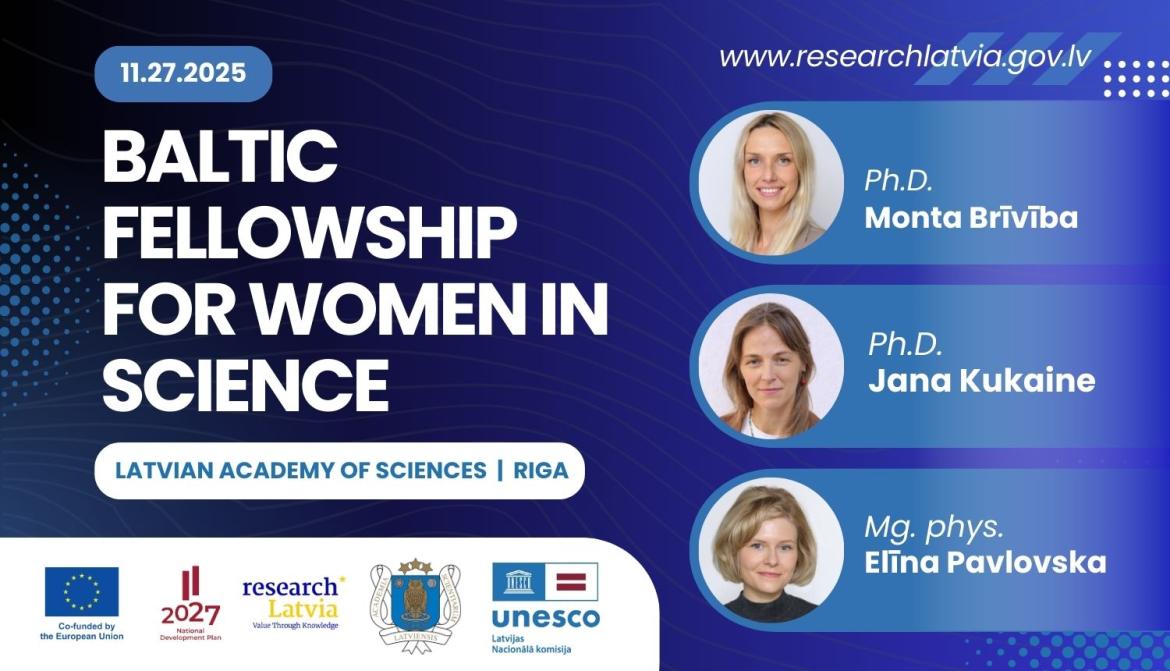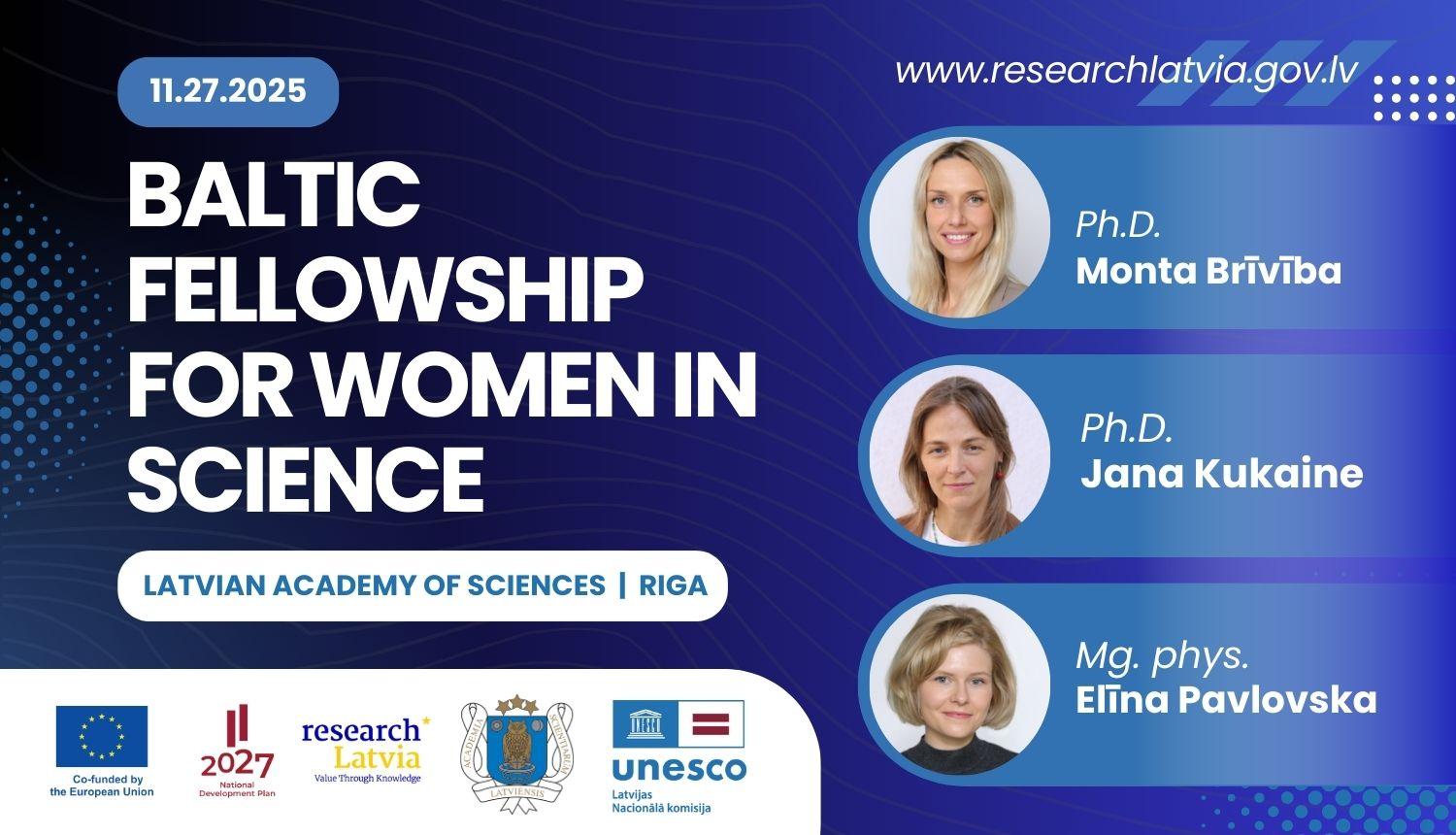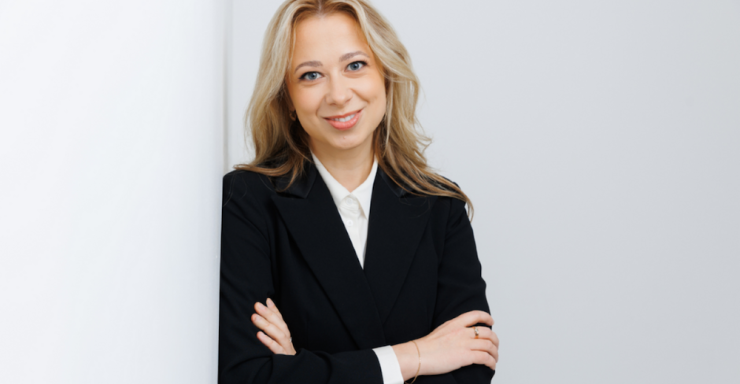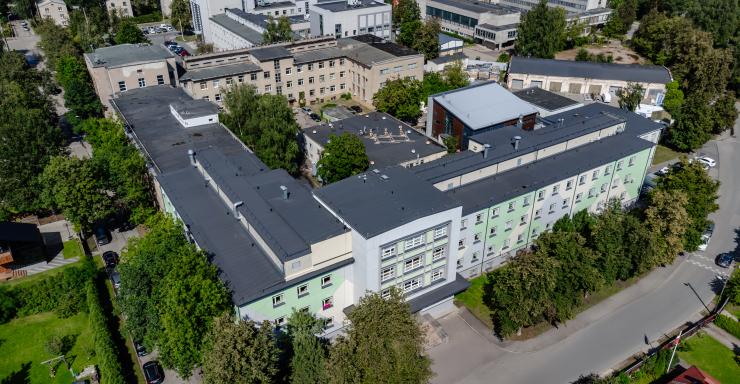Three young researchers in Latvia have become laureates of the “Women in Science” Baltic Fellowship 2025 contest – PhD Monta Brīvība, PhD Jana Kukaine, and Mg. phys. Elīna Pavlovska. The contest is organised by the Latvian Academy of Sciences (LAS) and the Latvian National Commission for UNESCO (LNC UNESCO) in cooperation with the Ministry of Education and Science of Latvia.
The fellowships are awarded by the Academies of Sciences and National Commissions for UNESCO of the Baltic States in cooperation with the Ministries of Education and Science. For the second year, nine scientists from Latvia, Lithuania and Estonia will receive the fellowship worth 7,000 euros in recognition of their previous work and to support the execution of a one-year research project as described in the application.
Monta Brīvība, PhD in Molecular Biology, is awarded the “Women in Science” Baltic Fellowship 2025 for her research "Precision Medicine in Oncology".
Jana Kukaine, PhD in Humanities, is awarded the “Women in Science” Baltic Fellowship 2025 for her research "Plant Aesthetics in Baltic Contemporary Art: Women's Stories and Experiences".
Elīna Pavlovska, Doctoral Candidate in Physics, is awarded the “Women in Science” Baltic Fellowship 2025 for her research "From Two-Particle Collisions to Collective States: Analysis of Electron Correlations in Mesoscopic Colliders".
LAS President Ivars Kalviņš emphasizes: "It is very important for the development of Baltic science to support the most talented female scientists on their path to the highest peaks of science, because it is difficult for women in science to compete with men, whose career growth is affected to a much lesser extent than that of women by the arrival of children in their families. Therefore, the Baltic Academies of Sciences and UNESCO National Commissions, within their capabilities and with the financial support of the Ministry of Education and Science, organise a fellowship contest specifically for young female scientists, as well as conduct an expert examination and evaluation of the performance of applicants. We can be proud that a truly wonderful generation of young female scientists is growing in Latvia and throughout the Baltics, and supporting their careers must remain our priority in the long term, so that our countries remain sustainable."

"In our rapidly changing world, scientific development plays an important role, and research support provides opportunities to address current challenges. Scientific discoveries help us build future perspectives that will improve the quality of people’s lives and strengthen public safety. The research topics of the fellowship laureates demonstrate how diverse and innovative the potential of young scientists is," says Baiba Moļņika, Secretary General of the UNESCO LNC.
This year fifty one applicants applied for the scholarship in Latvia. 38 applications were received for the contest for doctors of sciences, and 13 applications were received from doctoral candidates for their contest. 33 applications were evaluated in the fields of natural sciences, engineering and technology, medicine
and health sciences, and 16 applications in the fields of humanities and social sciences. The applications were evaluated by expert commissions of the science departments of the LAS, with the final decision being made by the joint expert commission of the LAS and UNESCO LNC.
The award ceremony of the laureates of the contest “Women in Science” Baltic Fellowship 2025 will be held on November 27 in Riga, in the Portrait Hall of the Latvian Academy of Sciences. The laureates of the competition from Estonia and Lithuania will also be welcomed at the ceremony.
About the “Women in Science” Baltic Fellowship
The scholarship was established in 2024 by the Latvian Academy of Sciences, the Estonian Academy of Sciences, and the Lithuanian Academy of Sciences in cooperation with the Latvian National Commission for UNESCO, the Estonian National Commission for UNESCO and the Lithuanian National Commission for UNESCO. The scholarship aims to evaluate and provide support to the best young female scientists from the Baltic States in their pursuit of excellence in science in national competitions, to enhance the visibility of female scientists, promote gender equality in the scientific world, and inspire the next generations of researchers.
The 2024 fellowship winners were Anne Sauka, Daniela Godiņa, Līga Ignatāne (Latvia), Mari Mari Tõrv, Kadri-Ann Pankratov, Marju Himma (Estonia), Greta Varkalaitė, Šarūnė Daškevičiūtė, Viltė Janušauskaitė (Lithuania).
About UNESCO
UNESCO (United Nations Educational, Scientific and Cultural Organization) is a specialized agency of the United Nations, which unites 194 countries around the world for cooperation in the fields of education, science, culture, communication and information, in order to promote peace, social well-being and sustainable development. Latvia joined UNESCO in 1991, since 1994 the Latvian National Commission for UNESCO ensures the implementation of UNESCO programs in Latvia and takes care of the representation of Latvia's interests and experience in UNESCO fields of activity internationally.
About the Latvian Academy of Sciences
The Academy of Sciences in Latvia was established in 1946. On March 15, 1990, it was transformed into the Latvian Academy of Sciences (LAS) as a classical personnel academy typical of European countries, which operates as an elected body of the most outstanding scientists and creative workers. The Latvian Academy of Sciences is a multidisciplinary science, research and expertise centre of national and international importance, which promotes the visibility of science, research and innovation, represents Latvian science in the international environment, and also participates in the preservation of national identity, cultural and artistic excellence.


